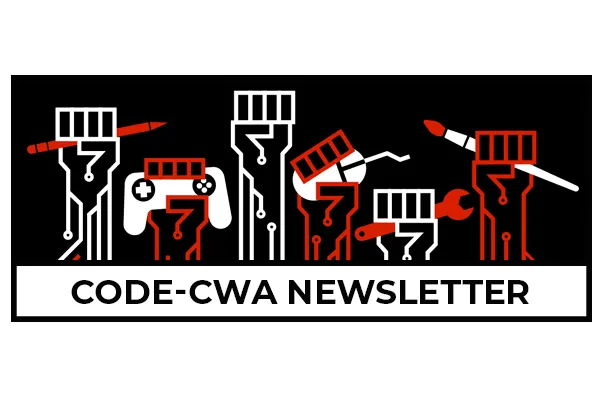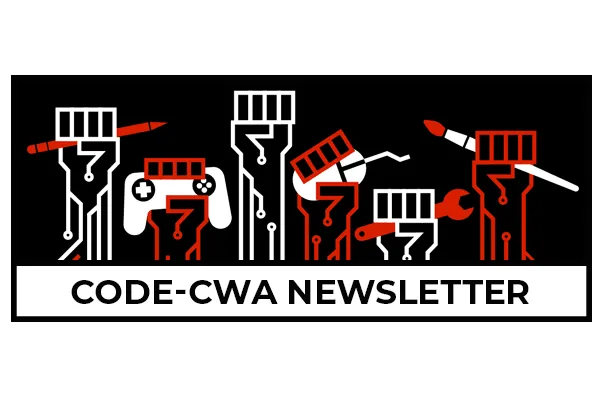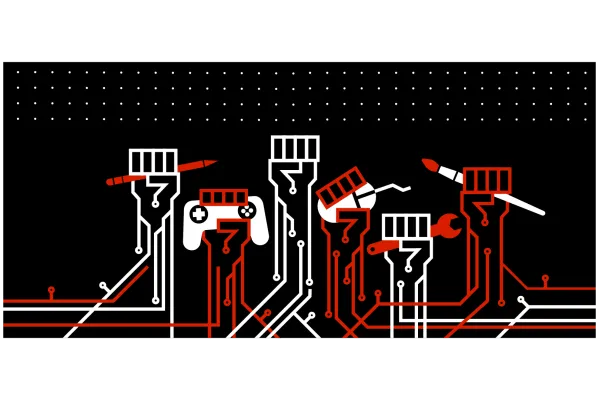CODE-CWA Newsletter: July 2

"It's almost like we were drawing inspiration from the very people who come to our platform to create change in their communities. We're drawing inspiration from them by speaking up for the change we want to see internally." - Sriya Sarkar, 30, a senior content producer at Change.org
A supermajority of eligible workers in the US and Canada at Change.org signed union cards with the Communications Workers of America, the next in a string of CODE-CWA organized tech workplaces. "This means Change.org workers have announced their certified union, thus joining Glitch, BlueState, Alphabet, Mobilize, NPR, NYT, Mapbox, and Catalist in their public unions. Change.org voluntarily recognized their union, becoming the largest tech organization to do so.
Jenn Chow of the Mapbox Workers Union joined Vice President Kamala Harris and Labor Secretary Marty Walsh for a roundtable discussion as part of the Biden administration’s Task Force on Worker Organizing and Empowerment. Chow shared an emotional moment withVice President Kamala Harri., “Hearing that — as a 1st generation [college student], my mom’s a single parent — I made less than my coworkers because they’re white males and went to Stanford or Berkeley, it doesn’t make me less than them,” she said. From big players such as Google to lesser-known companies like Glitch and Mapbox, the tech sector has seen a surge of union activism that would have been unthinkable just a few years ago. Tech workers increasingly view organized labor as a way to advocate for contractors in riskier positions, improve workplace conditions without fear of retaliation. And the conversation is reaching higher corridors of power
In this newsletter, we give you the latest on tech worker organizing from Change.org to Mapbox, and conversations around unfair and exploitative practices at tech and gig companies and more! Through our support of workers across the tech, games, and digital industries we have seen a cultural shift as workers turn to each other to bring the change they seek. This commitment to building democracy in the workplace will impact all of us.
Are you looking to organize your workplace? Reach out. We are ready to organize with you.
Events
On July 5, join us at a 12PM PST class where we talk about union basics, CWA organizing models, and some key ways to connect with co-workers through organizing conversations.
Training is active and participatory. This is Class 1 in a series, perfect for beginners. Sign up here. You can also join us on Jul 6 at a 10AM PST class where we talk about how to build a strong organizing committee, maintain it, and build a strong foundation from which you can run a successful union campaign.This is Class 2 in a series. Ideally students should take Class 1 first, but it's not required. Sign up here.
While you're signing up for classes don’t forget to check out our new “Organizing Training” page on the CODE-CWA website. You’ll find a training program overview, additional resources to strengthen your organizing study, a briefing on your right to organize and more! Check it out here.
Worker News
Workers Lead Change.org to Become Largest Tech Company to Recognize a Union
More than 70 workers in both the US and Canada at Change.org became members of the CODE-CWA Project. Management at Change.org agreed not to fight the union after a supermajority of its workers in the U.S. showed their support, avoiding the need for the vote to be recorded in an election. Bec Wilson, the acting chief operating officer at Change.org, told NPR that the organization is the largest tech company to voluntarily recognize an employee union. "We were committed from the beginning to support a union if a majority of relevant and eligible staff did, and they did," Wilson said. The next step is for both management and the union to negotiate their first contract, which is expected to start some time this fall. Change.org has 217 employees, and about half of them are in the U.S. About 23% of its workers are contractors. Change.org, a San Francisco startup founded in 2007, is one of the best known petition websites to drive social change. Read more on NPR.org
Amazon Delivery Companies Revolt Against Amazon
The recent shutdown of two Amazon delivery companies in Portland appears to be the first public example in the United States of such companies using their leverage to protest against Amazon.”Amazon’s conduct over the past two years has become intolerable, unconscionable, unsafe, and most importantly, unlawful,” a letter sent to Amazon by the attorney of the two delivery companies, Triton and Last Mile, reads. This appears to be the first public example in the United States of Amazon delivery service partners, small businesses that deliver packages exclusively for Amazon, using their leverage to protest against Amazon—which has been known to enforce strict rules that squeeze productivity out of their delivery drivers, putting drivers and the public at risk. Amazon's delivery service partner program, which launched in 2019 to compete with FedEx and UPS, relies on 2,000 small delivery companies that employ 115,000 drivers in the United States to deliver billions of packages each year. Read more on Motherboard.
Senators Send Letters to Uber and Lyft Over Face-Tracking Ad Tablets
Democratic Senators Amy Klobuchar and Richard Blumenthal sent letters to Uber and Lyft expressing privacy concerns about Face-Tracking Ad Tablets made by Alfi. The AI-powered ad tech company recently announced it would manufacture and ship 10,000 digital tablets that use facial recognition to personalize content or advertisements for passengers and gauge their reactions to Uber and Lyft drivers. Alfi claims that drivers can earn up to $350 in revenue so long as passengers actually engage with the content or ads, and claims that the tablets have reached hundreds of drivers in Miami. Read more on Motherboard.
HR and Harassment Training Doesn’t Work, and Everyone Knows It
HR is there to protect corporations from legal liabilities—it is not an effective tool to protect workers. You know what does? A union. In 2016, the US Equal Employment Opportunities Commission published their findings on workplace harassment. The report is even more damning in its findings on prevention efforts; “much of the training done over the last 30 years has not worked as a prevention tool — it’s been too focused on simply avoiding legal liability.” Despite Supreme Court precedents that insulate companies from legal fault if they have harassment training programs, there is not nearly enough empirical evidence to indicate that these programs actually prevent harassment. HR’s anti-harassment training is a legal fig leaf. It lets companies off the hook in court, without their having to stoop so far as actually protecting their workers.Bizarrely, while the report demonstrates that anti-harassment training isn’t provably effective, their proposed solution is more training. Specifically bystander intervention training — often implemented in communities and schools — which teaches witnesses to intervene in case of harassment. Read more here.
This Week in Labor History
July 2, 1892: The Homestead Strike is one of the deadliest labor-management conflicts in the nation’s history. The violence happened after striking workers were all fired on July 2, a dispute between Carnegie Steel and the Amalgamated Association of Iron and Steel Workers ensued and 12 people were killed in Homestead, Pennsylvania at a steel plant owned by Andrew Carnegie.
Song of the Week
They Have The Plant, But We Have The Power by The Simpsona
Come gather round, children,
It's high time ye learned
'Bout a hero named Homer
And a devil named Burns.
We'll march 'till we drop
The girls and the fellas.
We'll fight 'till the death
Or else fold like umbrellas.
So we'll march day and night
By the big cooling tower.
They have the plant
But we have the power.
Say Hello to CODE-CWA at GDC and Meet the Workers Who Are Changing the Face of the Video Game Industry


